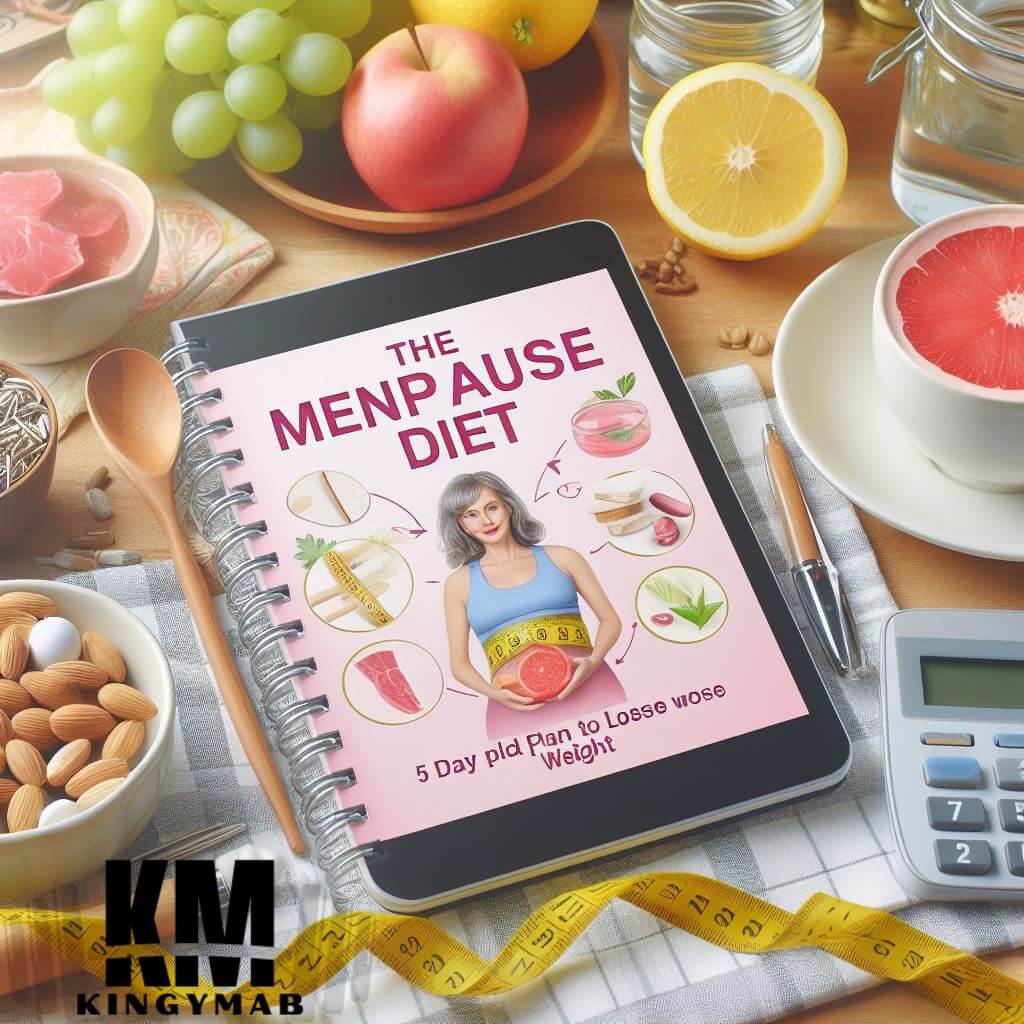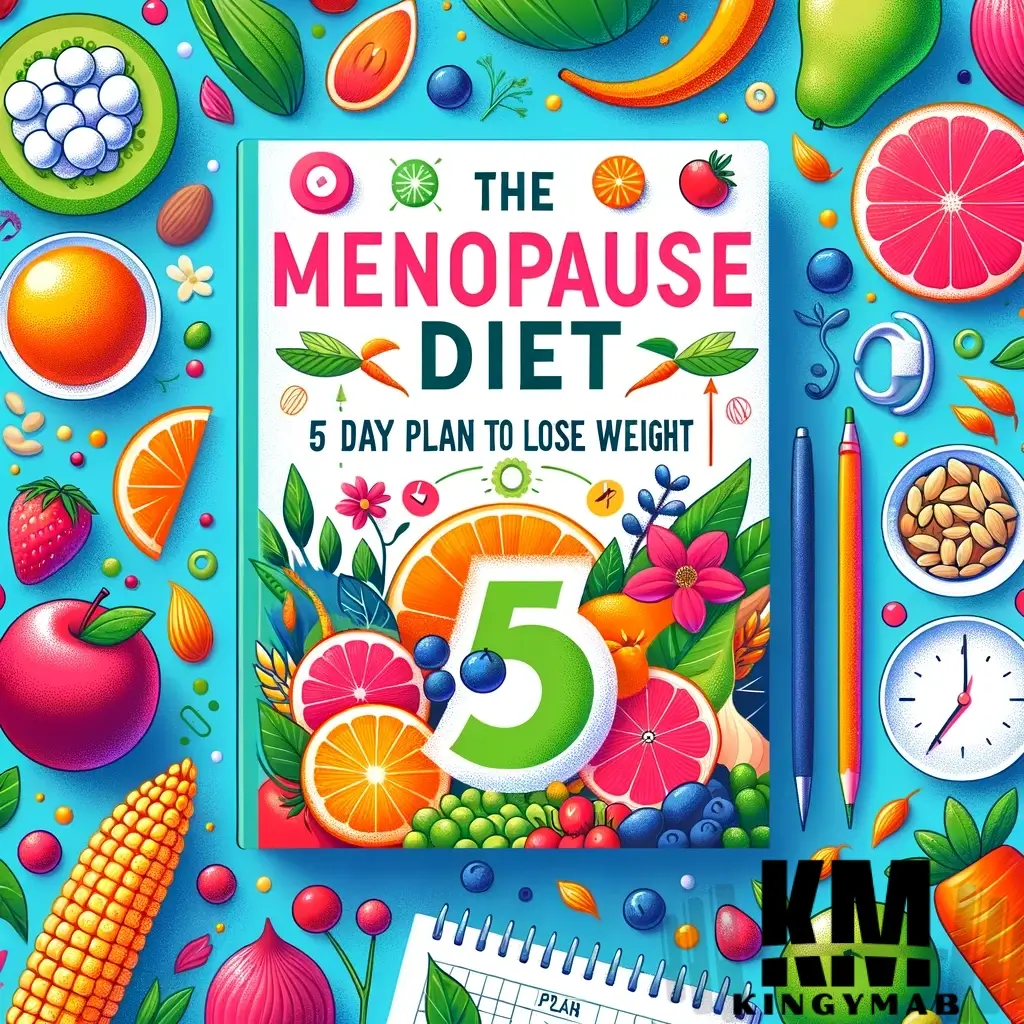Embrace a Healthier Menopause Journey with the 5-Day Diet Plan
Are you navigating the challenges of menopause, including unwanted weight gain? Fret not! We’ve crafted a comprehensive guide to help you embark on a transformative journey with the Menopause Diet: 5 Day Plan to Lose Weight. This carefully designed plan not only supports sustainable weight loss but also nourishes your body with essential nutrients during this transitional phase.
Understanding Menopause and Its Impact on Weight
Menopause is a natural biological process that signifies the end of a woman’s reproductive years. Typically occurring between the ages of 45 and 55, it is marked by a significant decline in the production of oestrogen and progesterone hormones. These hormonal changes can lead to various symptoms, including weight gain.
Hormonal Shifts and Weight Gain
During menopause, the decrease in oestrogen levels can cause a redistribution of body fat, leading to an increased accumulation around the abdomen, known as visceral fat. This type of fat is metabolically active and linked to an increased risk of chronic diseases, such as heart disease and type 2 diabetes (Kodoth et al, 2022; Kozakowski et al, 2017).
Slowing Metabolism and Weight Gain
As women age, their metabolism tends to slow down, resulting in the body burning calories at a slower rate than in younger years (Ko & Kim, 2020). If dietary habits remain unchanged, excess calories can accumulate as fat, contributing to weight gain during menopause.
The Importance of Nutrition During Menopause

Adopting a well-balanced diet becomes crucial during menopause to support weight management and navigate hormonal fluctuations. By focusing on nutrient-dense foods, you can provide your body with essential vitamins and minerals while managing calorie intake, reducing the risk of unwanted weight gain.
In addition to dietary changes, supplements like Menocil can also support hormonal balance and overall wellness during menopause, complementing your nutritional efforts
Foods to Prioritize During Menopause
| Food Group | Examples |
| High-Fiber Foods | Whole grains, fruits, vegetables, legumes |
| Lean Proteins | Fish, poultry, lean meats, tofu, pulses |
| Healthy Fats | Avocados, nuts, seeds, olive oil |
| Calcium and Vitamin D Sources | Dairy products, fortified foods, leafy greens |
The Science Behind Menopause and Weight Loss
Understanding the scientific principles behind menopause and weight loss is key to effectively managing your weight during this transition.
Calorie Intake, Metabolism, and Weight Loss
Weight loss primarily revolves around the concept of calories in versus calories out. During menopause, as metabolism tends to slow down, managing calorie intake becomes more important than ever. Various studies have found that women’s basal metabolic rate (BMR) decreases significantly during and after menopause (Poehlman & Tchernof, 1998; Ko & Jung, 2021). A decline in BMR means that women may need to consume fewer calories or increase physical activity to achieve and maintain a healthy weight.
Foods that Support Weight Loss during Menopause
Certain foods can be particularly beneficial in supporting weight loss during menopause:
- High-Fiber Foods: Foods like whole grains, fruits, vegetables, and legumes can help you feel fuller for longer (Shon et al, 2023).
- Lean Proteins: Incorporating lean protein sources can help preserve muscle mass and support a healthy metabolism (Gregorio et al, 2014).
- Healthy Fats: Sources like avocados, nuts, seeds, and olive oil can provide satiety and support overall health (British Nutrition Foundation).
The Menopause Diet 5 Day Plan to Lose Weight
In the Menopause Diet 5 Day Plan, emphasis is placed on both portion control and balanced nutrition. By carefully managing serving sizes and incorporating a variety of nutrient-rich foods, you can promote weight management and overall health during the menopausal transition.
Day 1 of the Menopause Diet 5 Day Plan
| Meal | Food |
| Breakfast | Hearty porridge topped with fresh berries and a drizzle of honey |
| Snack | Small handful of mixed nuts or Greek yoghurt |
| Lunch | Colourful salad with grilled chicken or tofu, dressed with olive oil and balsamic vinegar |
| Dinner | Baked salmon with steamed broccoli and quinoa |
| Beverages | Herbal tea or water |
Day 2: Gut-Healthy Choices
Begin with a smoothie made from kale, banana, and almond milk. Snack on sliced cucumber and carrot sticks with hummus. For lunch, enjoy a vegetable and lentil soup or a whole-grain sandwich with lean protein and plenty of veggies. In the evening, prepare a stir-fry with tofu or lean beef and a variety of colourful vegetables. Drink green tea or infused water for hydration.
Day 3: Balanced Meals
Start with a bowl of Greek yoghurt topped with sliced apple and a sprinkle of cinnamon. Snack on a portion of sliced melon or a small handful of grapes. For lunch, indulge in a whole-grain pasta salad with fresh vegetables and a light vinaigrette dressing. Enjoy roasted chicken with sweet potatoes and steamed green beans for dinner. Stay hydrated with herbal tea or water throughout the day.
Day 4: Plant-Based Focus
Begin your day with a fruit salad topped with a dollop of low-fat yoghurt. Snack on a handful of cherry tomatoes and a few whole-grain crackers. For lunch, feature a quinoa and vegetable stir-fry or a chickpea salad with a lemon-tahini dressing. Dinner consists of a tasty lentil curry with brown rice and a side of mixed greens. Herbal tea or water keeps you refreshed.
Day 5: Nutrient-Rich Fare
Kickstart the day with scrambled eggs and sautéed spinach. For a mid-morning snack, indulge in a small portion of dark chocolate (70% cocoa or higher). Lunch includes a hearty vegetable soup with a slice of whole-grain bread. End the 5-day plan with a celebratory dinner of grilled seafood, roasted asparagus, and quinoa. Sip on herbal tea or water throughout the day.
Additional Tips for the Menopause Diet 5 Day Plan
| Tip | Description |
| Stay Hydrated | Drink at least 8 glasses of water each day. |
| Portion Control | Use smaller plates to manage portion sizes. |
| Exercise | Aim for at least 30 minutes of moderate exercise daily. |
| Sleep | Get 7-8 hours of sleep each night. |
| Stress Management | Practice relaxation techniques like deep breathing or meditation. |
Lifestyle Tips for Long-Term Weight Management During Menopause

Achieving and maintaining a healthy weight during menopause is not only about what you eat but also how you live. Incorporating the following lifestyle tips can support your long-term weight management journey:
Stay Active During Menopause
Regular physical activity is a cornerstone of a healthy lifestyle during menopause. Aim for at least 150 minutes of moderate-intensity aerobic exercise or 75 minutes of vigorous intensity exercise each week, as recommended by the NHS. Strength training exercises can also help maintain muscle mass and boost metabolism.
Stress Management Techniques
Chronic stress can contribute to weight gain and exacerbate menopausal symptoms. Incorporating stress management techniques like mindfulness meditation, deep breathing exercises, or yoga can reduce stress levels and promote overall well-being (Johnson et al, 2019).
Prioritize Quality Sleep
Quality sleep plays a vital role in weight management during menopause. Poor sleep can disrupt hormonal balance, leading to increased appetite and cravings for unhealthy foods (Kravitz et al, 2018). Aim for 7-8 hours of uninterrupted sleep per night by creating a relaxing bedtime routine and limiting caffeine and screen time before bed.
Potential Challenges and Solutions for the Menopause Diet 5 Day Plan
| Challenge | Solution |
| Emotional Eating | Recognize emotional triggers associated with food and find healthier coping mechanisms like going for a walk or engaging in relaxation techniques. |
| Lack of Time | Meal prepping can help ensure you have nutritious meals on hand and portion control. |
| Slow Progress | Set realistic goals and remember that consistency and patience are key. Small steps can lead to significant progress over time. |
| Cravings | Plan for indulgences within moderation and balance them with nutrient-rich meals. |
Tracking and Monitoring Progress
Tracking your progress is essential for staying motivated and making any necessary adjustments to your Menopause Diet 5 Day Plan. Consider the following methods:
Body Measurements
Take regular body measurements, such as weight, waist circumference, hip size, and body fat percentage, to monitor changes in your body composition.
Visual References
Take progress pictures to visually track your journey and observe changes in your appearance.
Journaling
Keep a food journal to track your daily intake and note any changes in energy levels, mood swings, or other menopausal symptoms.
Seek Professional Guidance
Consult with a registered dietitian or healthcare professional to create a personalized plan tailored to your individual needs and medical information.
The Power of the Menopause Diet 5 Day Plan – A Snapshot
| Benefit | Description |
| Sustainable Weight Loss | The plan promotes healthy weight loss through portion control and balanced nutrition. |
| Nutrient-Dense Foods | It incorporates a variety of nutrient-rich foods to support overall health during menopause. |
| Holistic Approach | The plan addresses not only diet but also lifestyle factors like exercise, stress management, and sleep. |
| Personalized Guidance | Consulting with healthcare professionals ensures the plan aligns with your individual health needs. |
| Long-Term Success | By making informed choices and adopting a balanced diet, you can achieve lasting results. |
Conclusion: Embrace a Healthier Menopause Journey
Navigating the menopausal journey can be challenging, but with the right guidance and a comprehensive approach, you can embrace a healthier path. The Menopause Diet 5 Day Plan to Lose Weight offers a practical solution that not only supports weight loss but also nourishes your body with essential nutrients.
By prioritizing nutrient-dense foods, managing portion sizes, and incorporating lifestyle habits like regular exercise, stress management, and quality sleep, you can create a solid foundation for managing your weight during menopause and beyond. Remember, every woman’s journey is unique, and consulting with healthcare professionals ensures a personalized approach tailored to your individual needs.
Embrace this transformative phase with confidence, and embark on a path towards a healthier, more vibrant you.


